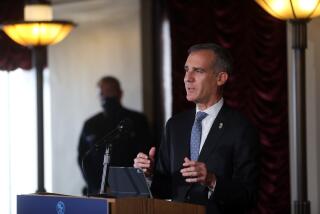Study to Seek Ways to Boost U.S. Science
The Carnegie Corp. of New York is launching a major national study to recommend ways that the United States can bolster science and technology and assure the nation’s economic future.
With a budget of about $1 million a year, a 23-member Commission on Science, Technology and Development will spend the next two to three years examining those issues, said David Z. Robinson, executive director of the study.
Robinson released details of the plan Wednesday after the closing session of a two-day Carnegie symposium at UC San Diego covering the same topic.
Recurrent Themes
Panel members will include UCSD Chancellor Richard C. Atkinson and two other key figures at the symposium--Joshua Lederberg, president of Rockefeller University, and William Golden, science policy consultant to President Harry S. Truman. Golden will be co-chairman of the panel.
The announcement addressed one of the recurrent themes articulated at the San Diego symposium: that there is a lack of coherent leadership in addressing America’s scientific and technological problems.
One area the symposium participants repeatedly wondered about is whether elementary and secondary schools can ever educate students well in science and technology.
Although the mood was pessimistic, the director of the Office of Equal Opportunities for the American Assn. for the Advancement of Science, Shirley Malcom, urged the group not to despair.
Noting that she was the only woman and the only black on Wednesday’s panel, she said the scientists of tomorrow will be people like she is. But strategies to improve science education and to bring women and minorities into science must be implemented nationwide, she said.
“We have no reason to be despairing,” Malcom said. “We know what we have to do. Let’s talk about spending the money that’s already being spent on the state and local levels to get the job done wisely. It is a matter of forming some sense of collective will. We must articulate a vision of where we want to go. And that means leadership.”
More to Read
Sign up for Essential California
The most important California stories and recommendations in your inbox every morning.
You may occasionally receive promotional content from the Los Angeles Times.









